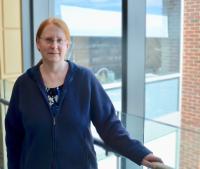
Igor Aronson, Huck Chair Professor of Biomedical Engineering, Chemistry, and Mathematics, has been awarded a Humboldt Research Award by the Alexander von Humboldt Foundation of Germany. The award recognizes a researcher whose achievements have had a significant impact on their field of study and who are expected to continue producing cutting-edge achievements in the future. Aronson uses mathematical modeling and experimental techniques to study systems where metabolism and other non-equilibrium processes lead to self-organization and collective behavior.

Donald A. Bryant, Ernest C. Pollard Professor of Biotechnology and professor of biochemistry and molecular biology, has been awarded the Charles F. Kettering Award by the American Society of Plant Biologists. He was selected for his use of cutting-edge molecular methods to study chlorophototrophic bacteria, which use chlorophylls to capture and convert light into biochemical energy. Over the last five decades, he has made seminal contributions to understanding the structure, function, and assembly of protein complexes involved in bacterial photosynthesis as well as the pathways involved in synthesizing pigment in these bacteria.

Cui-Zu Chang, assistant professor of physics, has been selected as an Emergent Phenomena in Quantum Systems Initiative (EPiQS) Investigator by the Gordon and Betty Moore Foundation. He will receive a five-year, $1.7 million grant to support his quantum materials research. Chang’s research focuses on synthesizing topological and other quantum materials using a technique called molecular beam epitaxy growth, which could have implications for next-generation electronics and spintronics, quantum computing, and energy-efficient high technology.

Michael Eracleous, professor of astronomy and astrophysics, was honored with a Faculty Mentor of the Year Award by the Southern Regional Education Board (SREB) State Doctoral Scholars Program at the annual Institute on Teaching and Mentoring conference. The conference is the largest gathering of minority doctoral scholars in the country, gives the issue of diversity in academic faculty a national focus, and provides minority scholars with the strategies necessary to succeed in academia. Eracleous was nominated by graduate student Mallory Molina, who said that his mentorship and support encouraged her to stay in graduate school. In his research, Eracleous uses light and X-rays to study how the central engines of active galaxies work.

Eric Ford, professor of astronomy and astrophysics, has been named a Simons Fellow in Theoretical Physics by the Simons Foundation. The fellowship provides funds to faculty for a semester-long academic leave, enabling recipients to focus solely on research for the long periods often necessary for significant research advances. Ford’s research focuses on improving our understanding of how planets form and evolve, both through theoretical modeling of planetary systems and interpretation of exoplanet observations.

Kurt Gibble, professor of physics, has been named an Institute of Electrical and Electronics Engineers (IEEE) Fellow. The fellowship is the highest grade of membership and is recognized by the technical community as a prestigious honor and an important career achievement. Gibble was recognized for contributions to improving the accuracy of atomic fountain clocks, highly accurate clocks that keep international atomic time.

Christine Keating has been named Distinguished Professor of Chemistry in recognition of her exceptional record of teaching, research, and service to the University community. Keating's research applies the approaches of colloid and interface chemistry—a science that seeks to understand the physical properties of various high-surface-area materials, such as emulsions and nanoparticles—to problems in biology and materials science.

John Nousek, professor of astronomy and astrophysics and director of the Swift Mission Operations Center at Penn State, has been honored as part of a Group Achievement Award for contributions to the Astrophysics Large Mission Study Teams. The teams provided substantial and effective scientific, technical, and management work in developing the Large Mission Concept Studies for the 2020 Astrophysics Decadal Survey, which seeks to identify key priorities in astronomy and astrophysics and develop a comprehensive strategy for agency investments.

Donald Richards has been named Distinguished Professor of Statistics in recognition of his exceptional record of teaching, research, and service to the University community. Richards applies a variety of statistical techniques to topics in astronomy and astrophysics, finance, actuarial science, and medical imaging.

David Weiss has been named Distinguished Professor of Physics in recognition of his exceptional record of teaching, research, and service to the University community. Weiss's research involves experiments with laser-cooled atoms in optical lattices and other light traps, which can be applied to technology such as quantum computers.

Lauren Zarzar, assistant professor of chemistry, has been honored with a 2020 Alfred P. Sloan Research Fellowship in chemistry, in recognition of her research in dynamic and adaptive materials, including areas of reconfigurable soft matter and laser direct writing of microscale materials. The fellowships, awarded annually by the Alfred P. Sloan Foundation, seek to stimulate fundamental research by early career scientists and scholars of outstanding promise. Zarzar’s research focuses on how complex fluids—such as droplets of two or more encapsulated oils—can be manipulated.
